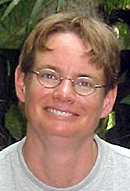From SBU Happenings – November 13, 2015 – SoMAS’ Jackie Collier Receives Funding from Moore Foundation for Microbial Ecology Research
Jackie Collier, an associate professor in the School of Marine and Atmospheric Sciences (SoMAS) at Stony Brook University, is studying tiny organisms called labyrinthulomycetes with the hope of making a big impact on understanding how the smallest marine life in our oceans affects the global carbon cycle. Collier is principal investigator on an experimental model system that has received funding from The Gordon and Betty Moore Foundation’s (GBMF) Marine Microbiology Initiative (MMI). Her team includes Joshua Rest, Department of Ecology and Evolution, Stony Brook University; Daiske Honda, Department of Biology, Konan University, Japan; and Thorsten Reusch, Helmhotlz Centre for Ocean Research, Germany.
The grant is part of The Moore Foundation’s overall $8 million investment to support scientists worldwide to accelerate development of experimental model systems in marine microbial ecology. Collier is among more than 100 scientists across 33 institutions to collectively tackle the challenge of developing methods to bring experimental model systems to the ocean. The genetic tools generated in this effort will allow researchers to more easily disrupt the activities of microbial genes to understand how these organisms function in marine ecosystems and provide the capability to ask scientific questions in ways not currently possible.
Model systems, such as the mammalian gut bacterium E. coli for microbiology and the fruit fly for biomedicine, have been invaluable for deciphering complex biology. But in the world of marine microbial ecology, there are very few model systems that enable scientists to deeply explore the physiology, biochemistry and ecology of marine microbes, which are key drivers of the ocean’s elemental cycles, influence greenhouse gas levels and support marine food webs.
Collier explained that oceanographers understand relatively well the “light side” of the marine carbon cycle: photosynthesis performed by microscopic phytoplankton that convert inorganic carbon dioxide into the organic carbon that provides food for marine food webs, including all the fish we eat. It is the “dark side” — respiration of heterotrophic marine organisms that returns carbon from organic forms back to carbon dioxide — that requires much more research.
Just like in photosynthesis, many diverse microorganisms are responsible for remineralizing marine carbon. Collier and her team will study labyrinthulomycetes, which are fungus-like single-cell microorganisms. They can be found everywhere in the oceans and can reach similar total biomass as bacteria, so they are likely to make a major contribution to the ‘dark side’ of the carbon cycle. “But we know very little about labyrinthulomycete ecology or physiology. The long-term goal of our GBMF EMS project is to develop the tools we need to learn enough about labyrinthulomycetes so that we can understand and model their role in the marine carbon cycle and food webs, and eventually predict how that may change as the climate and oceans change.”
Collier and her team will attempt to determine the functions of specific genes by manipulating their expression and/or activity in the lab. They will use genome sequences to identify elements that can be used to regulate the expression of reporter and marker genes, and will find the best way to introduce foreign DNA into diverse labyrinthulomycetes.
“Moore Foundation funding for this work is crucial,” Collier stressed, “it’s the kind of very basic effort that’s pretty much impossible to get funded by regular mechanisms. We greatly appreciate their support.”


Very interesting and informative article. I will search for more posts like this in your website. Comment from All Shops Directory user.